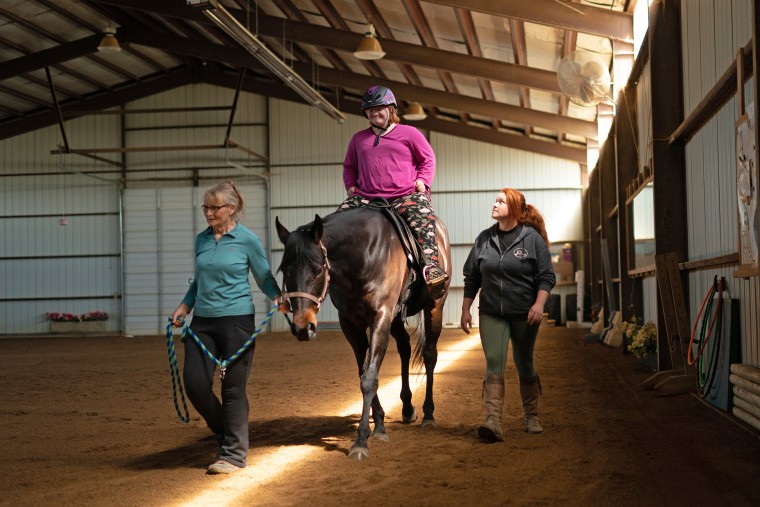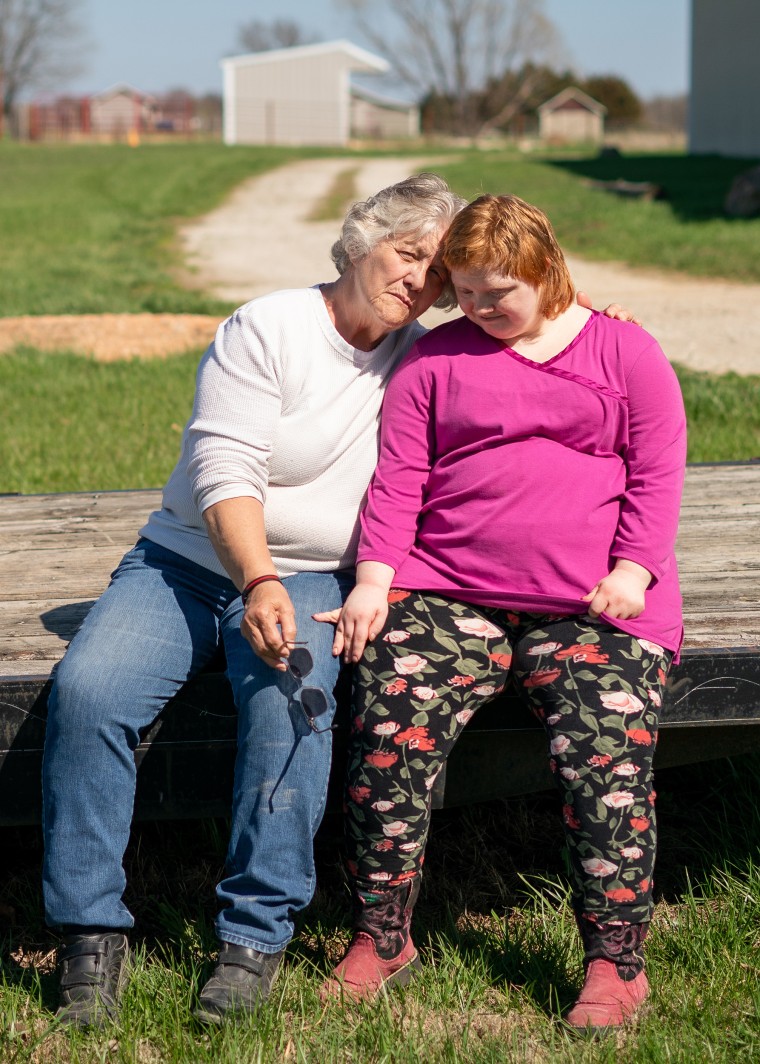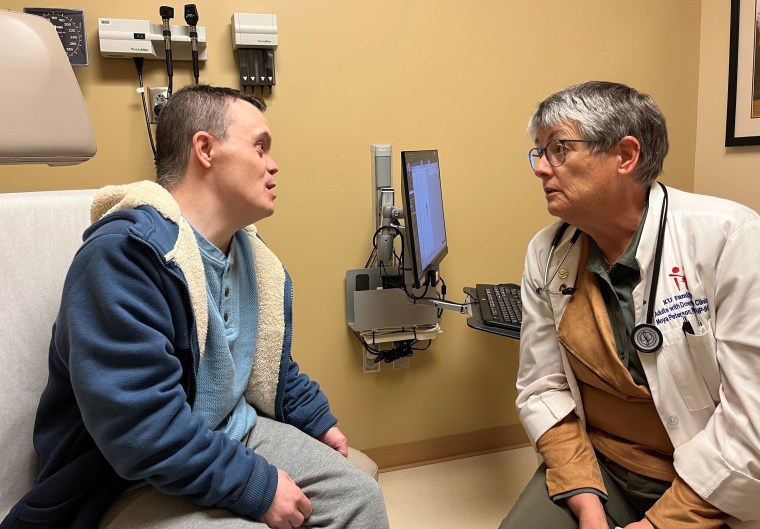Adults with Down syndrome face a health care system that often treats them as kids
MONTROSE, Mo. — It took Samantha Lesmeister’s spouse and children 4 months to locate a medical qualified who could see that she was struggling with a little something much more than her Down syndrome.
The youthful lady, identified as Sammee, had become unusually unfortunate and lethargic just after falling in the shower and hitting her head. She misplaced her minimal skill to talk, stopped laughing, and no extended preferred to go away the home.
Typical-observe physicians and a neurologist said this sort of mental deterioration was regular for a human being with Down syndrome getting into adulthood, recalled her mother, Marilyn Lesmeister. They reported nothing at all could be performed.
The family members didn’t purchase it.
Marilyn researched on-line and uncovered the University of Kansas Health and fitness Process has a exclusive medical clinic for grown ups with Down syndrome. Most other Down syndrome programs nationwide target on kids, even although a lot of individuals with the problem now stay into center age and normally acquire health problems typically associated with seniors. And most of the clinics that focus on grownups are in city locations, building access hard for a lot of rural clients.
The clinic Marilyn discovered is in Kansas City, Kansas, 80 miles northwest of the family’s cattle farm in central Missouri. She manufactured an appointment for her daughter and drove up.

The program’s leader, nurse practitioner Moya Peterson, carefully examined Sammee Lesmeister and requested a lot more checks.
“She reassured me that, ‘Mom, you are right. Something’s completely wrong with your daughter,’” Marilyn Lesmeister explained.
With the support of a next neurologist, Peterson determined Sammee Lesmeister experienced experienced a traumatic brain injuries when she strike her head. Given that that diagnosis about nine yrs in the past, she has regained a great deal of her strength and spirit with the assistance of therapy and steady support.
Sammee, 26, can all over again converse a several words and phrases, like “hi,” “bye,” and “love you.” She smiles and laughs. She likes to go out into her rural local community, the place she helps pick out meals at dining establishments, attends horse-riding sessions at a secure, and folds linens at a nursing household.
Without Peterson’s insight and encouragement, the relatives probable would have presented up on Sammee’s recovery. “She possibly would have ongoing to wither in herself,” her mother stated. “I think she would have been a stay-at-property individual and a recluse.”
“A entire diverse ballgame”
The Lesmeisters want Peterson’s software was not this sort of a rarity. A listing posted by the Global Down Syndrome Foundation lists just 15 health care applications nationwide that are housed outdoors of children’s hospitals and that take Down syndrome clients who are 30 or older.
The United States experienced about 3 situations as several older people with the situation by 2016 as it did in 1970. Which is generally since youngsters born with it are no lengthier denied lifesaving care, like surgical procedures to proper birth defects.
Grown ups with Down syndrome usually create serious wellness troubles, these as serious sleep apnea, digestive issues, thyroid circumstances, and being overweight. A lot of acquire Alzheimer’s disease in middle age. Researchers suspect this is relevant to more copies of genes that cause overproduction of proteins, which construct up in the brain.
“Taking care of young ones is a total distinct ballgame from having care of older people,” mentioned Peterson, the College of Kansas nurse practitioner.
Sammee Lesmeister is an case in point of the development towards extended lifetime spans. If she’d been born two generations back, she likely would have died in childhood.

She experienced a hole in a wall of her heart, as do about fifty percent of babies with Down syndrome. Surgeons can repair those people dangerous defects, but in the earlier, medical practitioners recommended most people to forgo the functions, or explained the youngsters did not qualify. A lot of people today with Down syndrome also had been denied care for major respiration concerns, digestive complications, or other long-term conditions. People today with disabilities ended up frequently institutionalized. Numerous have been sterilized with out their consent.
Such mistreatment eased from the 1960s into the 1980s, as persons with disabilities stood up for their legal rights, healthcare ethics progressed, and courts declared it unlawful to withhold treatment. “Those landmark rulings sealed the offer: Small children with Down syndrome have the suitable to the exact same lifesaving treatment that any other child would are worthy of,” mentioned Brian Skotko, a Harvard University health care geneticist who leads Massachusetts Standard Hospital’s Down Syndrome System.
The median life expectancy for a toddler born in the U.S. with Down syndrome jumped from about 4 years in 1950 to 58 yrs in the 2010s, according to a new report from Skotko and other researchers. In 1950, fewer than 50,000 People ended up dwelling with Down syndrome. By 2017, that selection topped 217,000, together with tens of thousands of persons in center age or outside of.
The populace is predicted to go on increasing, the report suggests. A couple of thousand expecting ladies a 12 months now select abortions following studying they’re carrying fetuses with Down syndrome. But those reductions are offset by the escalating selection of gals starting to be expecting in their late 30s or 40s, when they are extra probably to give beginning to a toddler with Down syndrome.
Skotko reported the clinical method has not retained up with the incredible maximize in the number of adults with Down syndrome. Numerous healthcare students understand about the problem only when training to take care of pediatric sufferers, he stated.
Couple individuals can vacation to specialized clinics like Skotko’s method in Boston. To support individuals who can’t, he started an on the net company, Down Syndrome Clinic to You, which assists households and professional medical practitioners understand the issues and attainable treatment plans.
“If they say it hurts, I pay attention”
Charlotte Woodward, who has Down syndrome, is a prominent advocate for enhanced care. She counts herself between the tens of 1000’s of grown ups with the condition who probably would have died decades ago without the need of appropriate remedy. Woodward, 33, of Fairfax, Virginia, had four heart surgical procedures as a little one and then a coronary heart transplant in her 20s.
Woodward, who is an training plan affiliate for the Countrywide Down Syndrome Society, has campaigned to conclusion discrimination in opposition to individuals with disabilities who have to have organ transplants.
She stated her major treatment doctor is great. But she has felt treated like a youngster by other health treatment suppliers, who have spoken to her parents as an alternative of to her in the course of appointments.
She reported several standard-observe medical practitioners feel to have little awareness about grown ups with Down syndrome. “That’s some thing that should really alter,” she reported. “It shouldn’t just be pediatricians that are knowledgeable of these points.”
Woodward said older people with the ailment need to not be anticipated to request treatment at systems housed in children’s hospitals. She mentioned the place ought to established up far more specialized clinics and finance far more investigate into wellness complications that influence people with disabilities as they age. “This is definitely an challenge of civil rights,” she mentioned.
Advocates and clinicians say it’s very important for wellness treatment companies to talk as much as achievable with clients who have disabilities. That can lead to long appointments, explained Brian Chicoine, a relatives observe physician who leads the Grownup Down Syndrome Heart of Advocate Aurora Wellness in Park Ridge, Illinois, close to Chicago.
“It’s extremely important to us that we include things like the people today with Down syndrome in their care,” he said. “If you’re performing that, you have to get your time. You have to explain points. You have to enable them course of action. You have to permit them solution. All of that will take extra time.”
Time prices dollars, which Peterson thinks is why lots of medical center techniques never set up specialized clinics like the types she and Chicoine operate.
Peterson’s methodical tactic was apparent as she observed new patients on a modern afternoon at her Kansas City clinic. She normally spends an hour on every initial appointment, talking specifically to patients and offering them a likelihood to share their ideas, even if their vocabularies are constrained.
Her clients that day integrated Christopher Yeo, 44, who lives 100 miles absent in the tiny city of Hartford, Kansas. Yeo experienced develop into not able to swallow stable food stuff, and he’d dropped 45 pounds above about 1½ a long time. He complained to his mom, Mandi Nance, that something “tickled” in his upper body.

During his test, he lifted his shirt for Peterson, revealing the scar where he’d experienced coronary heart operation as a baby. He grimaced, pointed to his chest, and regularly explained the term “gas.”
Peterson appeared Yeo in the eye as she asked him and his mom about his soreness.
The nurse practitioner takes severely any this kind of issues from her individuals. “If they say it hurts, I hear,” she explained. “They’re not heading to explain to you about it till it hurts lousy.”
Yeo’s mother experienced taken him to a cardiologist and other specialists, but none had decided what was wrong.
Peterson requested several inquiries. When does Yeo’s distress seem to crop up? Could it be linked to what he eats? How is his slumber? What are his stools like?
Just after his appointment, Peterson referred Yeo to a cardiologist who specializes in adults with congenital heart complications. She ordered a swallowing examination, in which Yeo would drink a particular liquid that appears on scans as it goes down. And she advised a exam for Celiac condition, an autoimmune disorder that interferes with digestion and is frequent in individuals with Down syndrome. No one had formerly told Nance about the threat.
Nance, who is a registered nurse, reported afterward that she has no strategy what the future retains for their household. But she was struck by the patience and notice Peterson and other clinic staff members associates gave to her son. This sort of treatment is uncommon, she mentioned. “I really feel like it’s a godsend. I do,” she mentioned. “I sense like it’s an answered prayer.”
“Like a man or woman, and not a ailment”
Peterson serves as the most important care provider for some of her sufferers with Down syndrome. But for many other individuals, specifically people who dwell considerably away, she is an individual to consult when difficulties arise. That is how the Lesmeisters use her clinic.
Mother Marilyn is optimistic Sammee can live a satisfying life in their community for years to appear. “Some persons have explained I want to set her in a household. And I’m like, ‘What do you signify?’ And they say, ‘You know ― a house,’” she reported. “I’m like, ‘She’s in a home. Our home.’”
Sammee’s sister, who life in Texas, has agreed to get her in when their dad and mom turn into way too outdated to treatment for her.
Marilyn’s voice cracked with emotion as she expressed her gratitude for the enable they have received and her hopes for Sammee’s future.
“I just want her to be taken treatment of and loved like I adore her,” she reported. “I want her to be taken treatment of like a individual, and not a issue.”
KFF Wellbeing News, previously recognized as Kaiser Health Information (KHN), is a nationwide newsroom that generates in-depth journalism about health and fitness issues and is one of the main functioning plans at KFF — the unbiased supply for health and fitness coverage investigate, polling, and journalism.
